
God is understood by different religions differently, due to the different time, place and circumstances in which He reveals His divine message. He does so due to the differing of consciousness, capacity and spiritual realisation of the audience to receive His message. So a truly religious person is respectful to the religious beliefs and freedom of others because he recognises that, despite different modes of worship, all true religions spring from the same Supreme Lord.
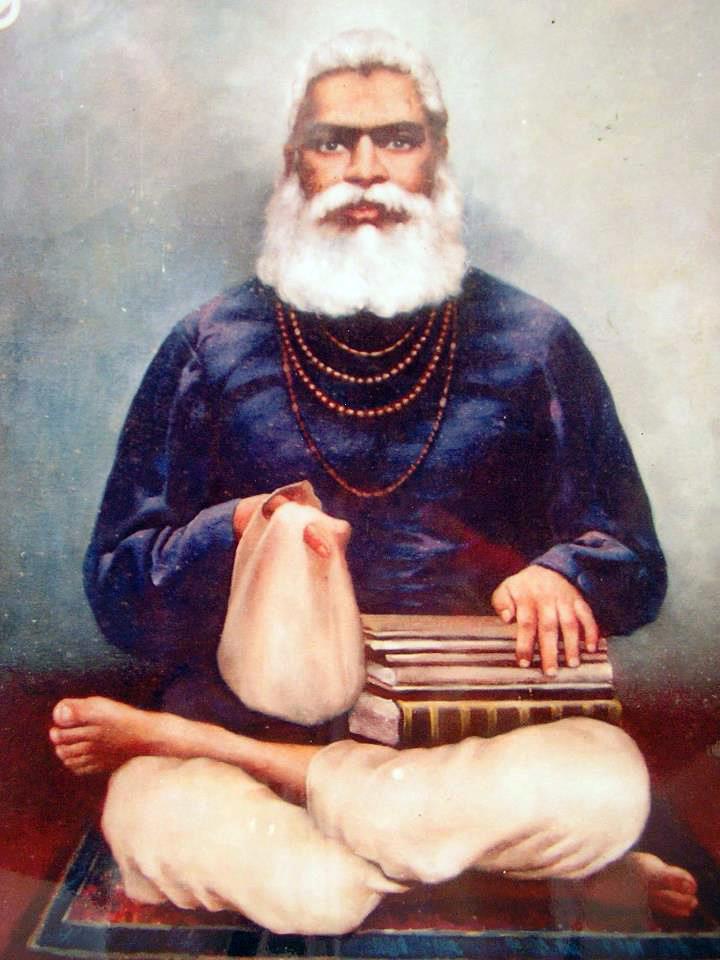
Srila Bhaktivinoda Thakur was a great saintly teacher in our disciplic line, who lived in India from 1838 until 1914. In his book Sri Caitanya: His life and Precepts, he describes how when Lord Chaitanya started His sankirtan [congregational chanting] movement in his home town of Nadia in Bengal, His many followers were singing the holy names of the Lord throughout the streets and bazaars of the town. At that time, certain envious caste brahmanas in the district became jealous of the Lord’s popularity and success, and opposed the sankirtan movement, claiming it was “un-Hindu.” Lord Chaitanya could see at this time that His movement would meet with less hindrance if he adopted the order of sannyas – the renounced order of life – by cutting off his connection with His family and caste. Lord Chaitanya declared at this time that:
Party spirit and sectarianism were the two great enemies of progress.
[Sri Caitanya: His Life and Precepts – Bhaktivinoda Thakura]
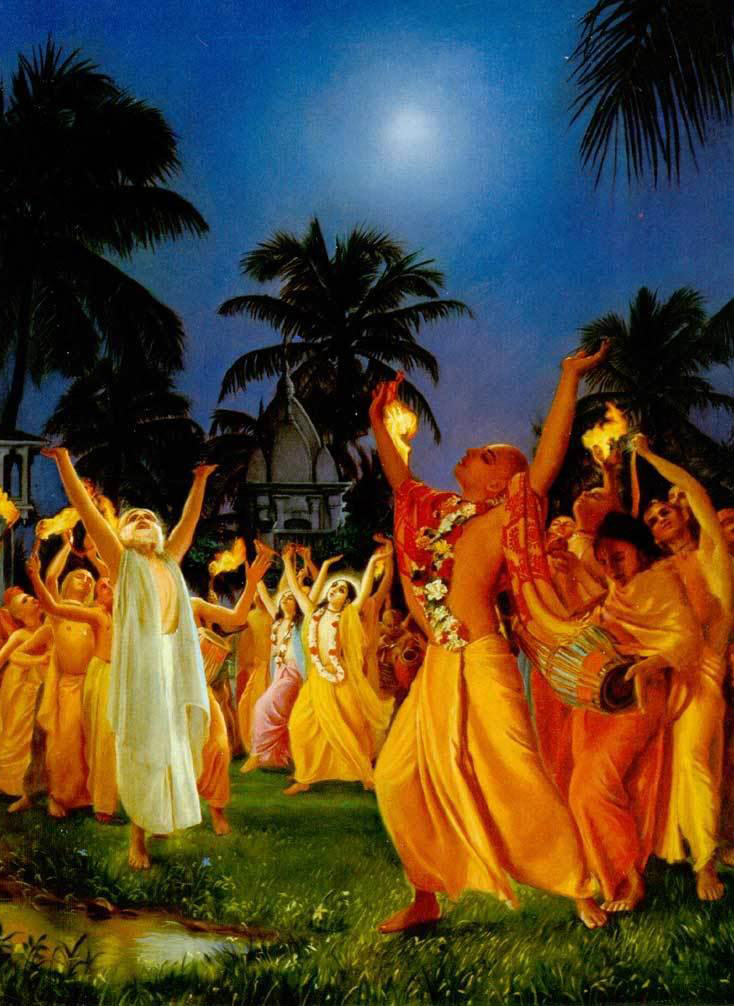
Vaisnava philosophy – the philosophy taught by Lord Chaitanya and His true followers in disciplic succession – has always been non-sectarian, recognising the truth wherever it is found, without the jealousy and insecurity of party spirit. Srila Bhaktivedanta Swami has included the Bible and Koran as parts of the Vedic scriptures:
‘Vedas’ means the books of transcendental knowledge. Not only the Bhagavad Gita, even the Bible or the Koran, they are also.
[Srila Bhaktivedanta Swami: lecture 29:7:68]
Srila Bhaktivinoda Thakur gave a large public lecture in 1869, in which he spoke of the danger of sectarianism and party-spirit in the pursuit of spiritual truth. He taught that all true religions spring from the one source – that God is one – and that we should not let our sectarian prejudices get in the way of our search for spiritual truth. The instructions of great saints may vary due to differences of time, place and circumstances, but the essential teachings of the world’s great religions are one and the same.
Bhaktivinoda Thakur said:
Subjects of philosophy and theology are like the peaks of large towering and inaccessible mountains standing in the midst of our planet inviting attention and investigation. Thinkers and men of deep speculation take their observations through the instruments of reason and consciousness. But they take their stand on different points when they carry on their work. These points are positions chalked out by the circumstances of their social and philosophical life, different as they are in the different parts of the world.

Plato looked at the peak of the spiritual question from the West, and Vyasa made the observation from the East; so Confucius did it from further East, and Schlegel, Spinoza and Kant and Goethe from further West. These observations were made at different times and by different means, but the conclusion is all the same in as much as the object of observation was one and the same. They all searched after the Great Spirit, the unconditioned Soul of the Universe. They could not but get an insight into it. Their words and expressions are different, but their import is the same.
They tried to find out the absolute religion and their labours were crowned with success, for God gives all that He has to His children if they want to have it. It requires a candid, generous, pious and holy heart to feel the beauties of their conclusions. Party-spirit – that great enemy of truth – will always baffle the attempt of the enquirer who tries to gather truth from religious works of their own nation, and will make him believe that the absolute truth is nowhere except in his old religious book. … truth does not belong exclusively to any individual man or to any nation or particular race. And man, whether in the Poles or on the Equator, has a right to claim it as the property of his Father.
[Bhaktivinoda Thakur: “The Bhagavat: It’s Ethics and Teachings”]

What is most valuable in spiritual life is cultivating a relationship with a pure representative of God – a genuinely enlightened spiritual master. We may attend programs of a particular religious organization. But it is of little value spiritually to say, “I belong to this or that organization.” You can attend a religious organization without having developed a relationship with God or His representative. Organizations come and go – they are not eternal. My relationship with my spiritual master and Krishna are eternal. The service I perform for my spiritual master and Krishna – particularly my internal service attitude – is my link to them, not my membership in any particular organization.
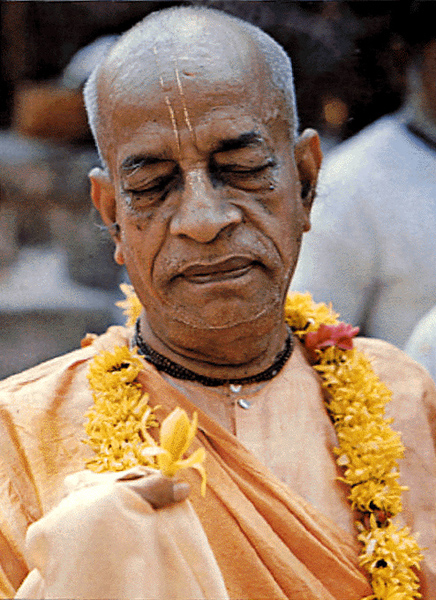
Srila Bhaktivedanta Swami was very clear on this point:
… It is imperative that a serious person accept a bona fide spiritual master in terms of the shastric injunctions. Shri Jiva Goswami advises that one not accept a spiritual master in terms of hereditary or customary social and ecclesiastical conventions. One should simply try to find a genuinely qualified spiritual master for actual advancement in spiritual understanding.
[A.C. Bhaktivedanta Swami: Caitanya-caritamrta Adi 1:35 purport]

When Lord Jesus Christ was active on this planet, he had no organization as such. There was no Catholic Church, no Wesleyan or Anglican or Presbyterian Churches with big church buildings and cathedrals etc. No big organizational hierarchies. The term Christianity had not even been invented at this time. What did his followers call themselves? They were “followers of Jesus.” So, I am a follower of Bhaktivedanta Swami and Jagad Guru Siddhaswarupananda. That is at least what I am trying to do with my life. It is a personal relationship thing, not a matter of having a position within an ecclesiastical system or hierarchy, not a matter of joining or belonging to an organization.
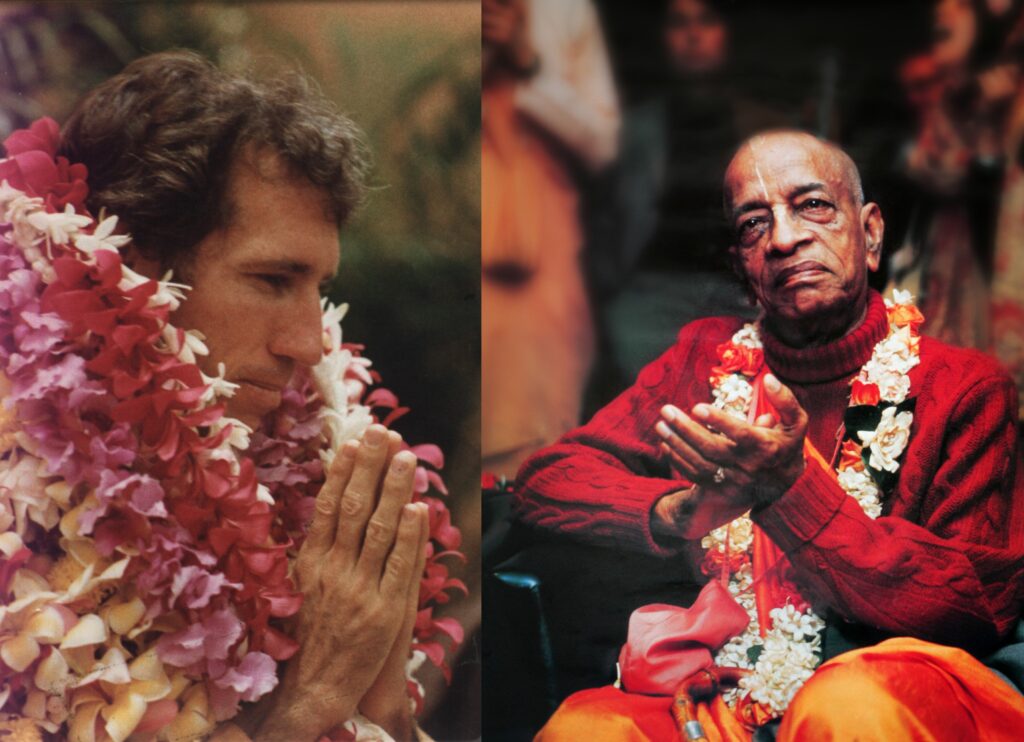
Jagad Guru Siddhaswarupananda has said that cats are more attached to their place of residence, their territory, than their owners. They are attached to being fed – often they will be very affectionate when it is dinner time, but quite aloof at other times. They are very attached to their territory, their spots where they sun themselves etc. Often if the owner of the house leaves, the cat will stay because they are more attached to the home than the master.

Dogs on the other hand are totally attached to their owner or master. They don’t care where they are as long as they can be with the object of their affection, and sometimes we hear of dogs travelling hundreds of miles to be with their owner.

I saw a video online of army veterans returning home from an overseas deployment. It showed their dogs going berserk with excitement and jumping all over them. Then they showed soldiers returning and their cats largely ignored them. They were content because they were still at home being fed. So Jagad Guru says we should be like dogs – not cats – in that we should be loyal to our masters, not to the organization or building we attend.
Organizations are useful when they are connected with and perfectly representing the teachings of a bona fide guru. Once they deviate, disobey their guru’s instructions or change his teachings, they become useless. The disciplic succession is likened to a tree, and those who claim to be part of it, but have changed the teachings for some ulterior reason, are likened to branches which have been lopped off the tree. Such branches will wither and die. No organization can own the Absolute Truth. And no organization can own Lord Chaitanya’s sankirtan movement. This movement is like a powerful river that cannot be dammed by any organization. The river of Lord Chaitanya’s mercy will just break the dam walls and keep flowing. It is a movement of pure souls who are empowered by Lord Chaitanya and by their spiritual masters. Its success is foretold in scripture, and it cannot be stopped.
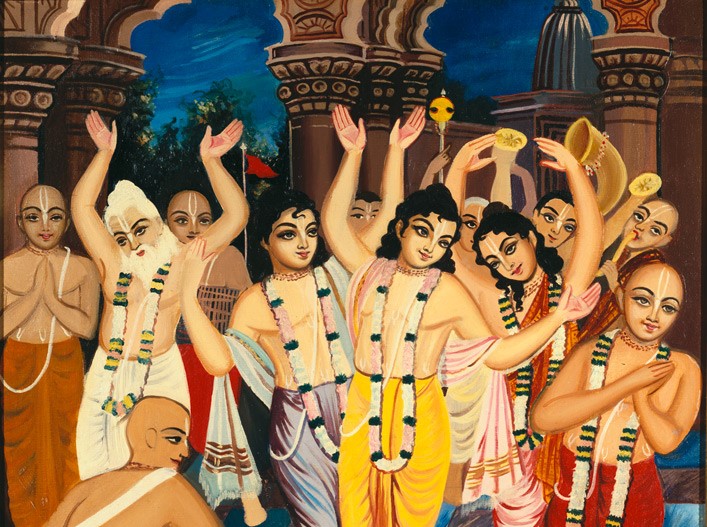
What should attract us to a saintly person is not the organization they belong to, but their wonderful spiritual qualities. And it is these qualities of a devotee which are so attractive to God. Spiritual life is not sectarian and neither is God’s love for us. God is in my heart. He sees my actions and He sees my desires. What pleases the Lord is my sincerity and my desire to please Him. What organization I belong to or don’t belong to is irrelevant. He is looking for my love. Krishna says in Bhagavad-gita:
To those who are constantly devoted and worship Me with love, I give the understanding by which they can come to Me. Out of compassion for them, I, dwelling in their hearts, destroy with the shining lamp of knowledge the darkness born of ignorance.
[Bhagavad-gita 10:10-11]

Spiritual life is about the individual spirit soul’s relationship with the Supreme Soul. If we are sincere in our devotion to God, He will give us guidance from within as to how to reach Him. He does not mention anything about joining any particular religious organization. In fact, He says “abandon all varieties of religion and just surrender unto me.” He lists the qualities which attract Him to a sincere soul:
Always think of Me and become My devotee. Worship Me and offer your homage unto Me. Thus you will come to Me without fail. I promise you this because you are My very dear friend. Abandon all varieties of religion and just surrender unto Me. I shall deliver you from all sinful reaction. Do not fear.
[Bhagavad-gita 18:65-66]
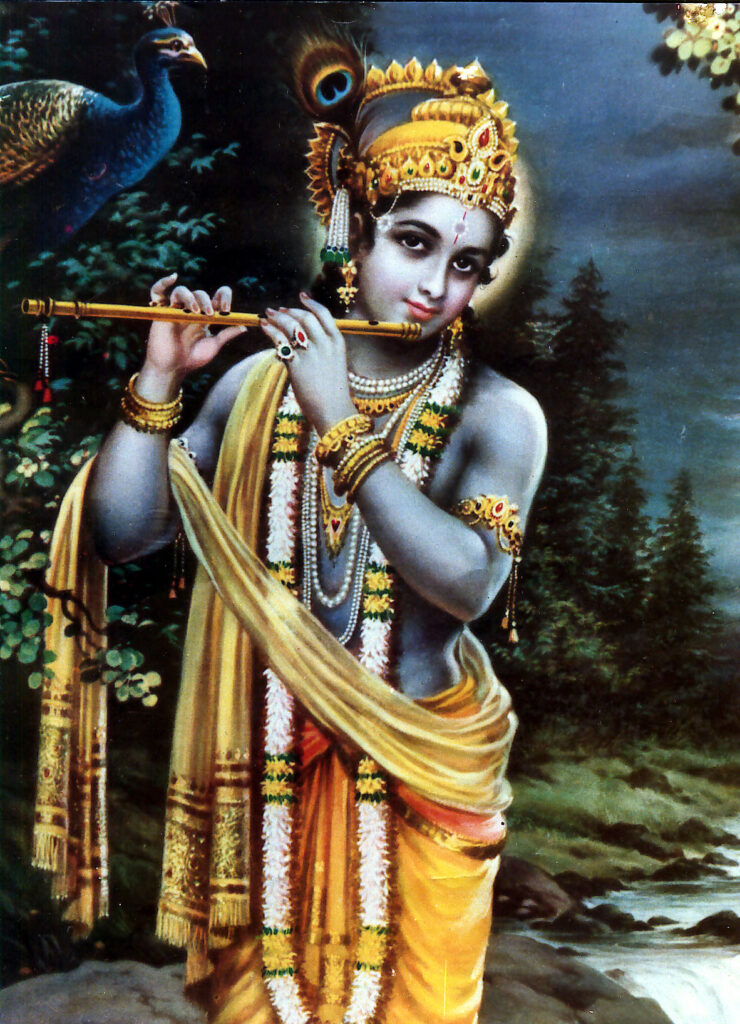
We need to apply spiritual wisdom to our own lives, and change our hearts, not just profess our allegiance to a particular teacher or religious institution. A person may be a great scholar or so-called religious leader, but if his heart is devoid of love for God, and if he is envious of actual saintly people, he will not have the spiritual potency to change the hearts of others. There are many so-called holy people – priests, pastors, yoga teachers and phony gurus – who have no connection with God, and are simply desirous of being worshipped themselves. Their primary interest is to lord it over others and exploit them for fame, wealth and sexual gratification. Jesus referred to such people as “wolves in sheep’s clothing.”

A genuine spiritual master is a humble servant of God who only wants to give others what is most beneficial – love for the Supreme Soul. Such a saintly teacher is completely devoid of any tendency to exploit others. He is a perfect examples of Lord Chaitanya’s fourth prayer:
O almighty Lord, I have no desire to accumulate wealth, nor do I desire beautiful women, nor do I want any number of followers. I only want Your causeless devotional service birth after birth.
Probably the best known Muslim of recent times, the boxer Muhammad Ali, was not caught up in the sectarian consciousness which causes so much havoc in today’s world. He said:
We all have the same God, we just serve Him differently. Rivers, lakes, ponds, streams, oceans all have different names, but they all contain water. So do religions have different names, and they all contain truth, expressed in different ways, forms and times. It doesn’t matter whether you’re a Muslim, a Christian, or a Jew. When you believe in God, you should believe that all people are part of one family. If you love God, you can’t love only some of His children.

The Koran says:
O Messenger of Allah! It is a great Mercy of God that you are gentle and kind towards them; for, had you been harsh and hard-hearted, they would all have broken away from you.
[Koran 3:159]
Moreover, a hadith narrated in Sahih Muslim states:
Kindness is the mark of faith, and whoever is not kind has no faith.
The same point is made in the New Testament:
Love is patient and kind; love does not envy or boast; it is not arrogant or rude.
[1 Corinthians 13:4]
Be kind and compassionate to one another, forgiving each other, just as in Christ God forgave you.
[Ephesians 4:32]
Put on then, as God’s chosen ones, holy and beloved, compassionate hearts, kindness, humility, meekness, and patience, bearing with one another and, if one has a complaint against another, forgiving each other; as the Lord has forgiven you, so you also must forgive.
[Colossians 3:12-13]

But the fruit of the Spirit is love, joy, peace, patience, kindness, goodness, faithfulness, gentleness, self-control; against such things there is no law.
[Galatians 5:22-23]
All true religions refer to God as being the Father of all living beings. Therefore, all souls are our brothers and sisters and they should be treated with respect and kindness. If we are envious or hateful to any of God’s children – no matter what body they are in – then we cannot hope to be pleasing to the Lord. Krishna says in Bhagavad-gita:
It should be understood that all species of life, O son of Kunti, are made possible by birth in this material nature, and that I am the seed-giving father.
[Bhagavad-gita 14:4]
A person who sees everything in relation to the Supreme Lord, and sees all entities as His parts and parcels, and who sees the Supreme Lord within everything, never hates anything, nor any being.
[Sri Isopanisad mantra 6]
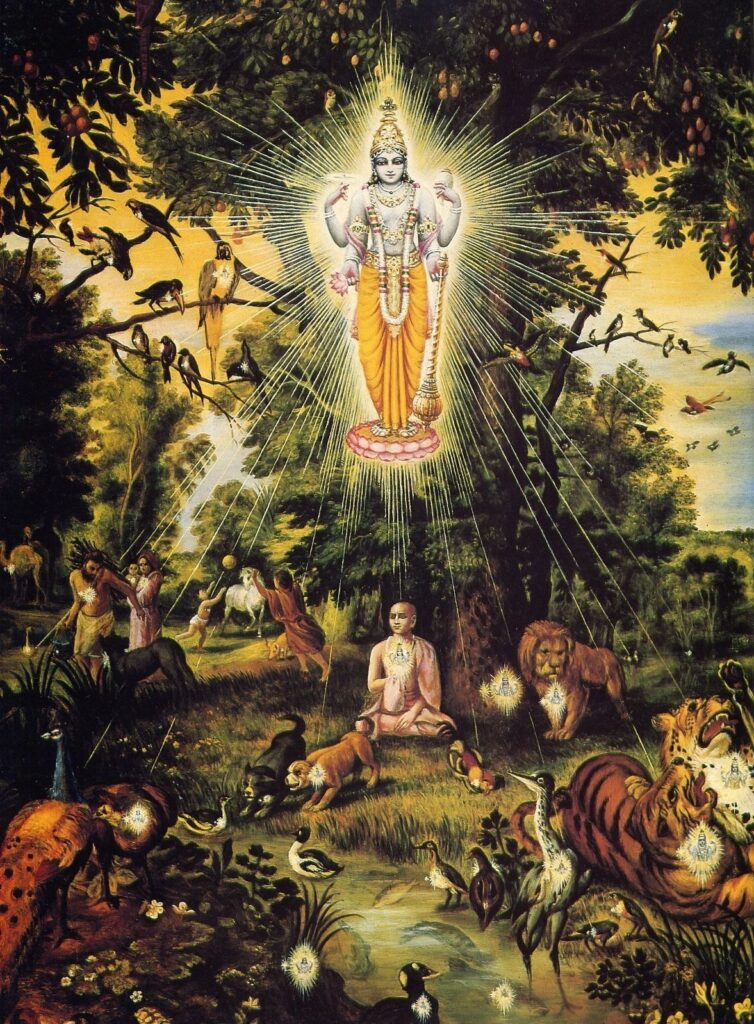
Vedic scripture describes three grades of devotees of the Lord. These grades are characterised by differeing degrees of spiritual love for the Supreme Lord and all of His children. It is impossible to love God or be pleasing to God while we hate any of His children. Hatred and envy are characterististics of those on the lowest level of religious faith.
The word “adhikary” refers to a devotee of God. A kanistha-adhikary is described in Vedic scripture as a materialistic devotee. One of his predominant symptoms is that he thinks that God can only be found in his temple, church, mosque or synagogue, or that He is the exclusive property of their religious organization. Therefore, the kanistha adhikary is usually very sectarian – sectarianism and fanaticism in the guise of religion is often the business of kanistha adhikaris. It is the kanistha adhikaris who give religion a bad name. This consciousness of envy and hatred is not found in the heart of a madhyam–adhikary [middle grade devotee] or uttama-adhikary [topmost pure devotee].

A lot of people say that religion only causes trouble in the world, that so many wars are fought in the name of religion. You have ISIS and other extremist groups, Shi’ites versus Sunnis, Catholics versus Protestants and historically the drowning of Anabaptists in Europe by both Catholics and Protestants, the Crusades and Spanish Inquisition etc. – this is all the work of kanistha-adhikaris. They do not understand that it is impossible to love God or be pleasing to God and at the same time to hate or be cruel to any of His children. Such fanatics are very far from God.

In his purport to Sri Isopanisad mantra 6, Srila Bhaktivedanta Swami describes the characteristics of these three grades of devotees. He says of the Kanistha-adhikary:
He cannot ascertain who is in what position in devotional service, nor can he tell who has realized the Supreme Lord. Such devotees follow the routine formulas and sometimes quarrel amongst themselves, considering one type of devotion better than another. These kanistha-adhikaris are actually materialistic devotees who are simply trying to transcend the material boundaries in order to reach the spiritual plane.
Of the Madyama-adhikary or middle grade of devotee, Srila Bhaktivedana Swami says:
Those who have attained the second stage of realization are called madhyama-adhikaris. These devotees observe four principles, which are: (1) They see, first of all, the Supreme Lord. (2) They see next the devotees of the Lord. (3) They see the innocent, who have no knowledge of the Lord. (4) They see the atheists who have no faith in the Lord and who hate those in devotional service. The madhyama-adhikari behaves differently according to circumstances. He adores the Lord, considering Him to be the object of love, and he makes friends with those who are in devotional service. He tries to awaken the dormant love of God in the hearts of the innocent, but he does not approach the atheists who deride the very name of the Lord.
And of the Uttama-adhikary or maha-bhagavata, a devotee who has attained perfect love for the Lord, Srila Bhaktivedanta Swami says:
In the third stage of realization is the uttama-adhikari, who sees everything in relation to the Supreme Lord. Such a devotee does not discriminate between an atheist and a theist but sees everyone as part and parcel of God. He knows that there is no difference between a vastly learned brahmana and a dog in the street because both of them are of the Lord, although they are embodied differently according to the qualities of material nature. He sees that the brahmana particle of the Supreme Lord has not misused his little independence given him by the Lord and that the dog particle has misused his independence and is therefore punished by the laws of nature by being encaged in an ignorant form. Not considering the respective actions of the brahmana and the dog, the uttama-adhikari tries to do good to both. Such a learned devotee is not misled by material bodies but is attracted by the spiritual spark within the respective entities.

In Srimad Bhagavatam, the non-envious and respectful nature of the pure lover of God is further described:
My dear sons, you should not envy any living entity – be he moving or nonmoving. Knowing that I am situated in them, you should offer respect to all of them at every moment. In this way, you offer respect to Me.
[Srimad Bhagavatam 5:5:26]
Srila Bhaktivedanta Swami says in his purport to this verse:
In this verse the word vivikta-drgbhih, meaning without envy, is used. All living entities are the abode of the Supreme Personality of Godhead in His Paramatma feature. … The Supreme Lord is situated everywhere, and wherever He is situated is His temple. We even offer respects to a temple from a distant place, and all living entities should similarly be offered respect. … An advanced devotee will offer respects to everyone – even to cats and dogs. …
The same point is made in the New Testament:
Do you not know that you are the temple of God and that the Spirit of God dwells in you?
[Corinthians 3:16]
This point is further explained by Lord Krishna in Bhagavad-gita:
The humble sage, by virtue of true knowledge, sees with equal vision a learned and gentle brahmana, a cow, an elephant, a dog and a dog-eater [outcaste] .
[Bhagavad-gita 5:18]
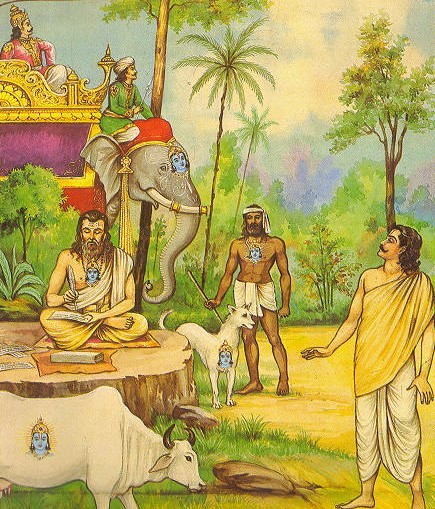
In his purport to this verse, Srila Bhaktivedanta Swami explains:
A Krishna conscious person does not make any distinction between species or castes. The brahmana and the outcaste may be different from the social point of view, or a dog, a cow, or an elephant may be different from the point of view of species, but these differences of body are meaningless from the viewpoint of a learned transcendentalist. This is due to their relationship to the Supreme, for the Supreme Lord, by His plenary portion as Paramatma, is present in everyone’s heart. Such an understanding of the Supreme is real knowledge. …
Lord Krishna further describes some of the qualities of a pure devotee of the Lord:
One who is not envious but who is a kind friend to all living entities, who does not think himself a proprietor, who is free from false ego and equal both in happiness and distress, who is always satisfied and engaged in devotional service with determination and whose mind and intelligence are in agreement with Me – he is very dear to Me.
[Bhagavad-gita 12:13-14]



Leave A Reply